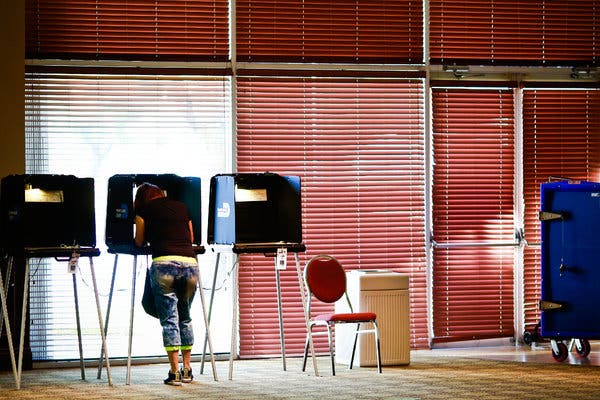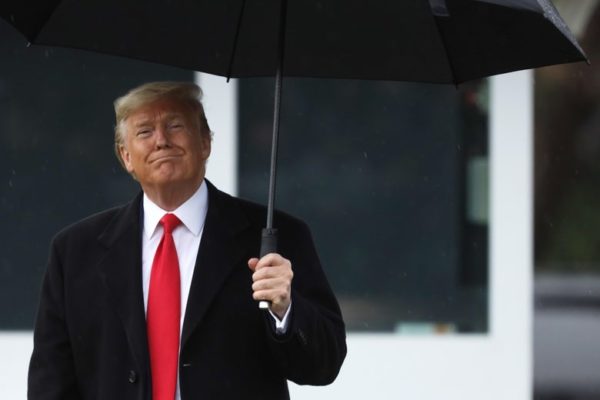President Donald Trump shattered Republican orthodoxy on an extraordinary range of economic policies in 2019, setting up a more populist record for him to tout during a 2020 campaign in which Democrats already are slamming him for abandoning working people.
From trade to spending, from the Federal Reserve to paid parental leave, Trump has embraced policy changes that historically are more in line with the approach of Democrats than Republicans in establishing a forceful role for government in setting the terms of the economy.
It is a sharp contrast to his first two years, when his main achievements included cutting regulations and a significant tax overhaul that emphasized reducing corporate tax rates — traditional bastions of policymaking for the GOP.
Trump has still pursued cuts to government spending that pinch poorer Americans — tightening rules on food stamp and allowing states to reduce Medicaid enrollment, for instance — that have fueled constant Democratic accusations he has betrayed voters.
But the breadth of Trump’s break with the GOP is striking.
On trade, Trump has reached a “phase one” trade deal with China that reportedly includes promises to buy far more in U.S. exports. He has completed a revamp of the North American Free Trade Agreement with Mexico and Canada that some liberals are cheering for labor protection and pharmaceutical policies.
Trump co-opted a demand from the left to urge the Federal Reserve to cut interest rates despite the relatively strong economy, a position the central bank ultimately adopted after seeing signs the economic expansion might waver.
The president has blown away traditional GOP concerns over the rising federal deficit, cutting bipartisan deals to expand government spending and even extend a new paid leave benefit to the federal workforce. He unilaterally implemented a farm bailout that could prove more expensive than the auto bailout was a decade ago — a move that conservatives had criticized as wasting taxpayer dollars.
And while taking action against President Barack Obama’s health care law in court, the Trump administration has avoided moves to immediately blow up the law while pushing to allow states to import cheaper prescription drugs — a longtime liberal position opposed by many Republicans.
Trump’s steps away from conservative economic orthodoxy have been building since the 2016 presidential campaign, when he shocked GOP elites on his way to a blowout victory in the Republican primary. But in many ways they appeared to reach their culmination in 2019.
“The administration this year has appeared to change its focus away from working with Congress on more typical Republican proposals, and toward an increasing focused on populist priorities,” said William Hoagland, senior vice president at the Bipartisan Policy Center and former Republican staff director for the Senate Budget Committee.
Some analysts say the emphasis on populist economics could upend the 2020 presidential election, as the issues that may have helped give Democrats control of the House in the 2018 midterms — particularly the attempt to repeal Obamacare and the Republican tax law — could recede while other White House initiatives become more prominent.
The Trump administration is likely to continue its aggressive trade actions in its fourth year, turning to negotiations with the United Kingdom, Europe, and possibly India and Vietnam, said Peter Navarro, assistant to the president for trade and manufacturing policy, in an interview.
These economic priorities serve as a contrast with the highly partisan politics of impeachment, which is expected to play out with a Senate trial early next year.
Democrats maintain Trump sold out his working-class base to the GOP donor class after his election, but the attack may grow less potent as the tax cut in particular loses its immediacy.
Celinda Lake, a Democratic pollster at Lake Research Partners, said that Democratic elites such as lawmakers, think tank leaders, and consultants have been alarmed by Trump’s economic populism.
“Typically, Republicans offer things like the deficit and the stock market — the upscale economic agenda — but Trump is trying to include the semblance of a working class economic agenda,” she said. “It isn’t real when you look underneath the hood, but it sure looks real absent an alternative.”
Trump’s policy shift also illustrates his power over congressional Republicans.
Two core party constituencies for decades — free market traders and deficit hawks — are at risk of being effectively exiled from the GOP, as some Republican lawmakers quietly fume at being sidelined repeatedly over policy matters.
“I see the restraints coming off all over the place. It’s been a less cautious approach as Trump has realized he doesn’t have to pay attention to traditional Republican advisers,” said Ed Dolan, an economist at the Niskanen Center, a libertarian-leaning think tank. “There don’t seem to be any conservative voices around him anymore that disagree with him.”
Less trade uncertainty, lower interest rates and more government spending will mean an economy growing faster than it otherwise would, even if expectations remain for a modest 2 percent growth in 2020. That could be a boon to the president’s reelection prospects, though Democrats say Americans are still hurt by stagnant wages and widespread economic anxiety.
Trump’s policies could still create longer term risk.The surge in federal deficits and cuts to interest rates may limits the tools America has to respond to an economic downturn, should one arrive in the final year of Trump’s first term or later.
And, politically, Trump could remain vulnerable on health care, a top concern among voters, having overseen a rise in both costs and the number of people without insurance.
“I really say it’s mostly lip-service,” said Dean Baker, an economist at the left-leaning Center for Economic and Policy Research, of Trump’s populism while in office. “If you look at his big changes, it’s really the tax cut that went to the top 1 percent and there’s no dispute from that. The rich have really benefited and everyone else gets a show.”
Trump may point to steady economic growth and historically low unemployment numbers, but critics say those are largely disconnected from his populist economic policies.
“Most of the jobs that have been created are in the services-type industries – his constituency in the middle of the country may not be helped by a lot of these policies,” said Chris Rupkey, chief financial economist at MUFG Union Bank. “And trying to change these forces of globalization — it won’t have an impact for 10 or 20 years, if it happens at all. These are very slow-moving forces.”
Kayleigh McEnany, a spokeswoman for Trump’s reelection campaign, said in a statement: “Trump promised to change decades of failed trade policy, revive manufacturing, and bring relief to middle class families. He has done all that and more.”
Trump’s presidency began with an unsuccessful effort to undo President Obama’s 2010 health care legislation, which would have cut federal spending but also cost millions of Americans their health insurance. Republicans then united successfully around a more than $1.5 trillion tax cut.
“When Trump first came into office, the priorities he agreed with — the tax bill, repealing Obamacare — required legislation, and so he needed hill Republicans led by orthodox conservative Paul D. Ryan,” said Doug Holtz-Eakin, a Republican economist and former director of the Congressional Budget Office.
But since Democrats gained control of the House starting in 2019, the White House has either had to compromise with House Speaker Nancy Pelosi, D-Calif., or act unilaterally.
“What changed this year is that for the policy issues on the table he could move unilaterally, and he did,” Holtz-Eakin said. “These are nontraditional Republican positions and they have come to the fore in the past year.”
Among the most serious clashes with his own party has been over trade. Republicans have traditionally resisted tariffs and supported large business groups in their quest for expanding international markets. Democrats have typically led the charge to crack down on China trade practices and revamp NAFTA.
Trump flipped this dynamic upside-down. After blasting America’s trade relations with foreign nations as a presidential candidate, Trump took action on the issue by launching a trade war with China and slapping increasingly aggressive tariffs on other countries.
Business groups that had been strongly supportive of the tax overhaul criticized Trump for raising prices for American consumers and disrupting global supply chains.
Trump’s advisers were in the meantime willing to agree to significant concessions to House Democrats and labor groups to seal a new trade agreement with Canada and Mexico, angering some Republicans but also earning the pact bipartisan cover.
“Trump’s unique brand of populism is essentially an economic nationalism based on an America first perspective, applied to both domestic policies and the international trade arena. This revolution has repositioned the Republican Party into the party of the working class,” said Navarro, the Trump trade adviser.
“In the past, Republicans were willing to sacrifice our economy on the altar of national security — but if you do that you wind up losing both.”
Perhaps just as surprising is how Trump has upended the GOP positions on both monetary and fiscal policy.
The president demanded Federal Reserve Chair Jerome Powell reverse course and back off raising interest rates. At the same time, the president has rejected Fed nominees pushed by traditional conservatives who likely would have raised rates.
“It seems that [Trump’s] appointments are fully on board for the critique leftists have been making about monetary policy,” said Sam Bell, founder and policy director of Employ America, a left-leaning organization advocating on economic policy.
A spending splurge under Trump may mark an even more dramatic retreat in conservative economic policy, as annual deficits have risen to close to $1 trillion despite the sustained run of economic growth.
Trump campaigned on preventing cuts to Social Security and Medicare, largely bucking long-standing GOP calls to reduce the national deficit by targeting America’s two large government programs. In practice, his administration has gone even further than avoiding cuts to those programs, expanding federal spending in multiple budget deals while opportunistically using them to win concessions on other priorities, such as Space Force.
Trump’s policy opportunism may be novel for American politics, but his grab bag of economic positions fits a bigger global trend of conservative populists like Boris Johnson in the United Kingdom, who has pledged to increase spending on Britain’s national health program.
“Populist forces are a global phenomenon. They cut across the traditional left-right cleavage. Many populists aren’t traditional free-market neoliberals or fiscal conservatives in their economic policies,” said Pippa Norris, a political scientist at Harvard.
Whether that will permanently remake the Republican Party, on the other hand, remains an open question.
“Republican lawmakers privately still believe the deficit is a problem and support free trade — but they’re not going to say that publicly because it’s not where their voters are,” said Brian Riedl, a budget analyst at the libertarian-leaning Manhattan Institute. “I’m not sure Trump has changed the minds of Republican lawmakers as much as he has won over the base and lawmakers understand crossing the president is political suicide.”





